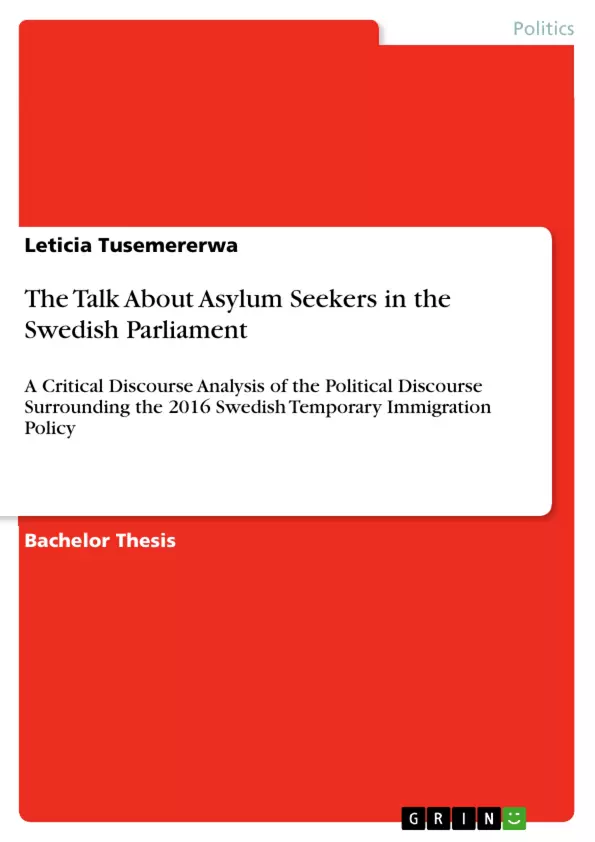This study examines the political-parliamentary discourse surrounding the 2016 Swedish temporary immigration policy with a focus on political construction of asylum seekers. Both the propositional parliamentary paper and debate were put to analysis using Critical Discourse Analysis in order to find out themes ad constructions that manifests political discourse of asylum seekers. It is argued the political-parliamentary discourse surrounding the 2016 temporary immigration policy within the propositional parliamentary paper and debate served to negatively affect the image of asylum seekers via their construction as something negative through the use of words associated with ‘them’: overload and strain on the asylum and social system, threat to integration system, threat to national security, economic burden, queue jumpers, liars, criminals, and morally deviant. This is deemed to contribute to the ‘Othering’ as projection of characteristics is created through marking asylum seekers in a different language of the deviance negative other. This can result to stereotypes, exclusion and marginalisation of asylum seekers, thus diminishing their right to protection.
Inhaltsverzeichnis (Table of Contents)
- Introduction
- Rationale for the study
- Relevance to IMER-International Migration and Ethnic Relations
- Research problem
- Aim and Research Question
- Materials and data collection
- Definitions
- Previous Research
- Immigration policy history in Sweden
- Political discourse and construction of asylum seekers
- Delimitation
- Disposition
- Conceptual and theoretical framework
- The "Othering"
- The "Stranger" and moral panic
- Elements of 'othering'
- Methodology
- Critical Discourse Analysis method
- Ethics, Validity, and Reliability
- Findings and Analysis
- Construction of asylum seekers in the temporary policy propositional paper and parliamentary debate
- An Overload and Strain on the asylum and social system
- Threat to Integration system
- Threat to National Security
- Economic burden
- Queue-jumpers
- Liars
- Criminals
- Morally deviant
- Humans in need of humanitarian aid
- Tool for integration
- Contribution of the construction of asylum seekers in the 2016 Swedish temporary immigration propositional paper and parliamentary debate on the theory and concept of 'othering'
- Discussions and Conclusion
- Further Research
Zielsetzung und Themenschwerpunkte (Objectives and Key Themes)
This study examines the political discourse surrounding the 2016 Swedish temporary immigration policy, focusing on how asylum seekers are portrayed in this discourse. Through a critical discourse analysis of both parliamentary documents and debates, the study aims to identify themes and constructions that shape the political understanding of asylum seekers.- The political-parliamentary discourse surrounding the 2016 temporary immigration policy negatively affects the image of asylum seekers.
- Asylum seekers are constructed as a threat to Sweden's social, integration, and security systems.
- The discourse employs language that marks asylum seekers as "other," leading to exclusion and marginalization.
- The study applies the concepts of "othering" and "stranger" to analyze the political discourse surrounding asylum seekers.
- The study explores the role of the "stranger" and "moral panic" in shaping public perception of asylum seekers.
Zusammenfassung der Kapitel (Chapter Summaries)
The introduction outlines the rationale for the study, its relevance to international migration and ethnic relations, and the research problem. It also details the aim and research question, data collection methods, definitions, previous research on Swedish immigration policy and the construction of asylum seekers, delimitations, and the study's disposition. Chapter two presents the conceptual and theoretical framework. This chapter explores the concepts of "othering" and the "stranger" in relation to moral panic and outlines key elements of "othering." Chapter three details the methodology employed, focusing on critical discourse analysis and addressing ethical considerations, validity, and reliability. Chapter four presents the findings and analysis of the parliamentary documents and debates. This chapter examines how asylum seekers are constructed within the discourse, exploring themes such as the burden on the social and asylum systems, threats to integration and national security, economic burden, and the perception of asylum seekers as queue-jumpers, liars, criminals, and morally deviant.Schlüsselwörter (Keywords)
The study focuses on the discourse surrounding the 2016 Swedish temporary immigration policy, examining how it shapes the understanding and perception of asylum seekers. Key terms include: Swedish 2016 Temporary Immigration Policy, political discourse, parliamentary discourse, othering, stranger, asylum seekers, critical discourse analysis.Frequently Asked Questions
What is the focus of the study on Swedish parliamentary discourse?
The study focuses on the political construction of asylum seekers within the context of the 2016 Swedish temporary immigration policy, using Critical Discourse Analysis (CDA).
What does "Othering" mean in this research?
"Othering" refers to the social and linguistic process of marking asylum seekers as a deviant or negative "other," projecting characteristics that lead to exclusion and marginalization.
How were asylum seekers portrayed in the 2016 parliamentary debates?
They were often constructed negatively as an economic burden, a threat to national security, "queue-jumpers," or as putting an unsustainable strain on the social and integration systems.
What are the consequences of negative political discourse for asylum seekers?
Such discourse can lead to the creation of stereotypes, social exclusion, and a diminishing of their fundamental right to protection and humanitarian aid.
What theoretical frameworks are used to analyze this discourse?
The study utilizes the concepts of "The Othering," "The Stranger," and "Moral Panic" to understand how parliamentary language shapes public perception.
- Quote paper
- Leticia Tusemererwa (Author), 2017, The Talk About Asylum Seekers in the Swedish Parliament, Munich, GRIN Verlag, https://www.grin.com/document/450113



